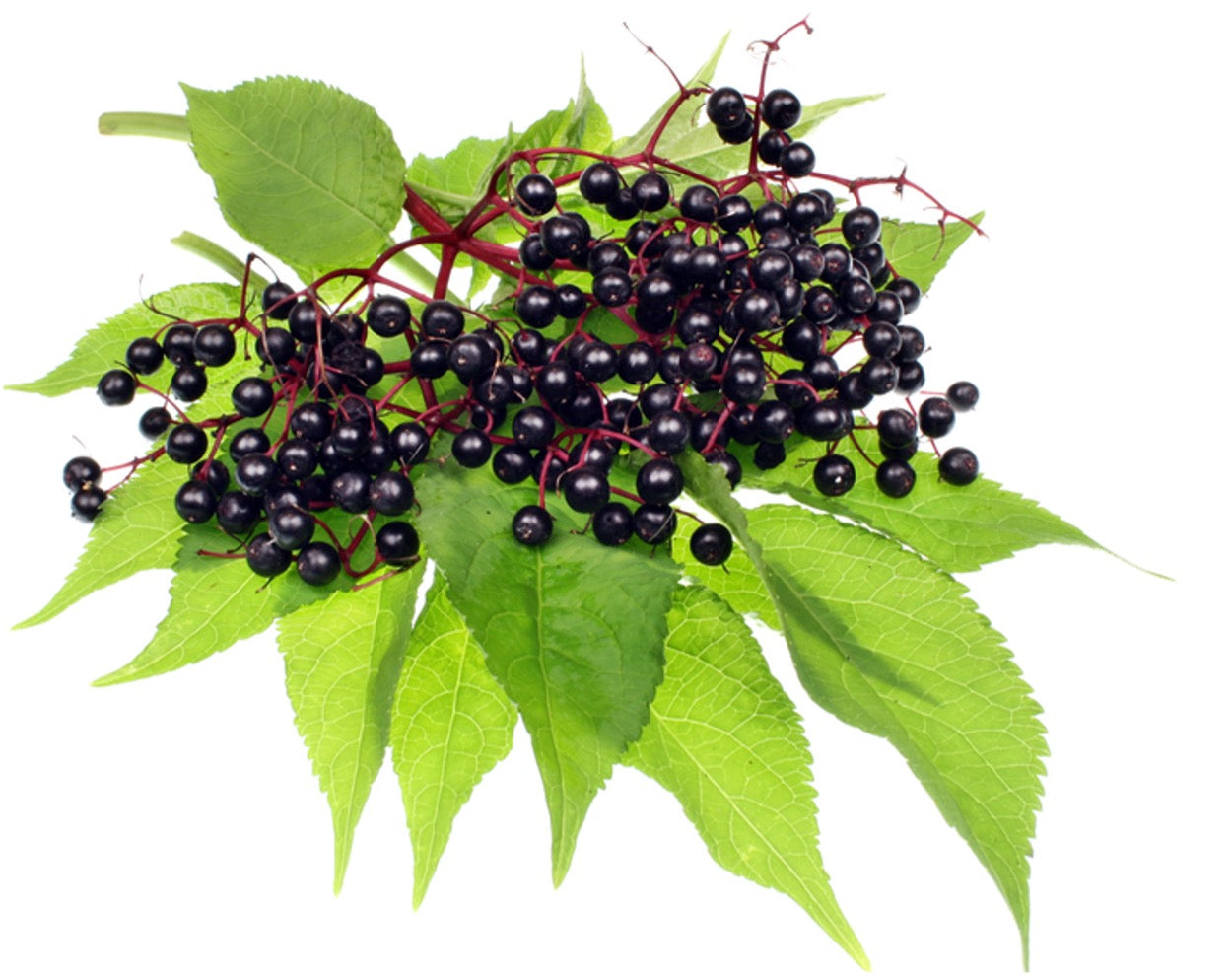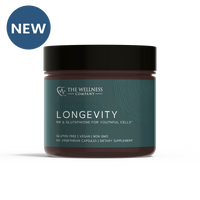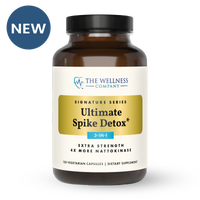Elderberry: Nature's Flu-Fighting Superhero

Effective Against the Flu and Possesses Powerful Antibacterial Properties
Elderberry, derived from the Sambucus nigra plant, has been a staple in traditional medicine for thousands of years. Greek physician Hippocrates referred to the elder tree as his "medicine chest," recognizing its diverse healing properties. Throughout history, elderberry has been used to treat a wide range of ailments, from inflammations and burns to gout and excessive phlegm. Elderberry's versatility has made it a go-to remedy in folk medicine. Indigenous peoples of North America have been using elderberry since at least 1300-1000 BCE. The berries were traditionally used to treat coughs and colds, while the flowers were made into teas to address fevers and colic in babies. (1,2)
Powerful Antiviral and Antibacterial Properties
Studies have shown that elderberry extract can significantly reduce the duration and severity of flu symptoms—both influenza A and B. It also has proven antibacterial properties against bacteria that cause upper respiratory tract infections. This is particularly important because influenza starts as a viral infection and can progress to bacterial pneumonia.
Elderberry:
- Inhibits viral activity at all stages of infection, with a stronger effect during the late stage.
- Suppresses viral entry into cells.
- Modulates the post-infectious phase.
- Prevents viral transmission to other cells.
- Upregulates certain cytokines, suggesting an indirect effect on the body's immune response.
- One study found that people who took elderberry syrup recovered from the flu an average of four days faster than those who didn't. (3)
In addition to its antiviral properties, elderberry has demonstrated antibacterial activity against both Gram-positive bacteria of Streptococcus pyogenes (one of the most common secondary post-influenza infections), group C and G Streptococci, and the Gram-negative bacterium Branhamella catarrhalis, which are responsible for upper respiratory tract infections. (4,5,6)
In another study, elderberry demonstrated antibacterial activity against S. aureus (a common type of bacterial pneumonia), which is one of the most common forms of post-influenza infections. (7,8)
Side Effects and Cautions
Elderberry has a very high safety profile, however, there are occasional mild side effects which may include nausea, vomiting, stomach cramps, and diarrhea. Elderberry may interact with certain medications, including immunosuppressants, and diuretics (elderberry has mild diuretic qualities). Exercise caution if pregnant or breastfeeding, and for those with autoimmune disorders. As with all supplements, consult with your healthcare provider before adding any new supplement, especially if you have pre-existing health conditions or are taking other medications.
A DIY Recipe to Make Your Own Syrup
Elderberry Syrup (link to recipe)
Skip the Mess, Try Our Super Immune Elderberry Gummies

If you want to skip messy syrups, our strawberry gummies are packed with antioxidants, polyphenols, and natural compounds that are not only delicious but contain vitamins C, D, zinc, and quercetin, promoting a robust immune system.
Citations
- Zakay-Rones, Z., Varsano, N., Zlotnik, M., Manor, O., Regev, L., Schlesinger, M., & Mumcuoglu, M. (1995). Inhibition of several strains of influenza virus in vitro and reduction of symptoms by an elderberry extract (Sambucus nigra L.) during an outbreak of influenza B Panama. Journal of Alternative and Complementary Medicine, 1(4), 361–369.
- Penn State Extension. (2024). Elderberry in the garden and the kitchen. Retrieved December 23, 2024, from https://extension.psu.edu/elderberry-in-the-garden-and-the-kitchen
- Crispo, M. (2024). Elderberry’s anti-viral activity: An update. Natural Medicine Journal. Retrieved December 23, 2024, from https://www.naturalmedicinejournal.com/blog/elderberry%E2%80%99s-anti-viral-activity-update
- Tiralongo, E., Wee, S. S., & Lea, R. A. (2016). Elderberry supplementation reduces cold duration and symptoms in air-travelers: A randomized, double-blind placebo-controlled clinical trial. Nutrients, 8(4), 182.
- Krawitz, C., Mraheil, M. A., Stein, M., Imirzalioglu, C., Domann, E., Pleschka, S., & Hain, T. (2011). Inhibitory activity of a standardized elderberry liquid extract against clinically-relevant human respiratory bacterial pathogens and influenza A and B viruses. BMC Complementary and Alternative Medicine, 11(1), 16.
- Van der Sluijs KF, van der Poll T, Lutter R, Juffermans NP, Schultz MJ. Bench-to-bedside review: bacterial pneumonia with influenza - pathogenesis and clinical implications. Crit Care. 2010;14(2):219. doi: 10.1186/cc8893. Epub 2010 Apr 19. PMID: 20459593; PMCID: PMC2887122.
- Martău, G. A., Teleky, B.-E., Soporan, D. A., Vodnar, D. C., Simon, E., & Bochiș, M. (2023). Bioactive potential of elderberry (Sambucus nigra L.): Antioxidant, antimicrobial activity, bioaccessibility, and prebiotic potential. Molecules, 28(7), 3099. https://doi.org/10.3390/molecules28073099
- https://pmc.ncbi.nlm.nih.gov/articles/PMC2887122/#:~:text=Bacteria%20such%20as%20Staphylococcus%20aureus,prominent%20pathogen%20involved%20%5B15%5D














